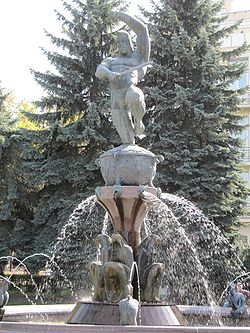| This article needs additional citations for verification. Please help improve this article by adding citations to reliable sources. Unsourced material may be challenged and removed. Find sources: "Sosruko" – news · newspapers · books · scholar · JSTOR (January 2010) (Learn how and when to remove this message) |


Sosruko, Sosruquo, or Sosriqwa, Soslan (Adyghe: Саусэрыкъо; Ossetian: Сослан, Soslan; Kabardian: Сосрыкъуэ, Sosryqwa; Sosuruq/Sosurqa) is a central character in many cycles of the Nart sagas of the North Caucasus.
Sosruko is a powerful but devious man who is the smallest of the Narts; as a character, he is sometimes cast in the light of the trickster god, comparable to the Scandinavian Loki (who finds a closer parallel in the Nart Syrdon, however), Georgian Amirani, or the Ancient Greek Prometheus. It is possible that at least in the latter case, Sosruku served as a direct inspiration.
In Circassian mythology, it was the Nart Sosriqwe, minion of the gods and his doting mother, Lady Satanaya, who stole fire from the giant.
Etymology
One folk etymology states that Sosruko is from Circassian sa "sword" + wa "hit" + sər "heat" + qʷa "son"; hence literally “the son of the fiery sword hit”. Other variants are:
- Abkhaz: Sasərqwa,
- Adyghe: Саусэрыкъо [saːwsarəqʷa],
- Kabardian: Сосрыкъуэ ,
- Ubykh: ,
- Digor Ossetian: Sosruqo, Sozyryqo, Sozuruqo and Sozyruko.
In Ossetian, the name Soslan etymologically came from Turkic languages: Nogai suslan- "to look menacing", suslä "menacing, gloomy" (hence Ossetian: Soslan).
Another plausible etymology is that the Ossetic term "Sozyr" in the regional variant "Sozyryqo" is cognate with the Persian "Sezavar", meaning "he who is worthy", with the suffix being of exogenous origin. This would explain why in the notably conservative Digor-Ossetic dialect, the name Sosruko is preferred over the Turkic name Soslan, and why the name "Sozyr", without the suffix, is so common among Digor-Ossetian elders.
References
External links
- Nart Tales of the Circassians - Reocities personal page
- The Circassian Nart Epos - International Centre for Circassian Studies
This article relating to a European folklore is a stub. You can help Misplaced Pages by expanding it. |